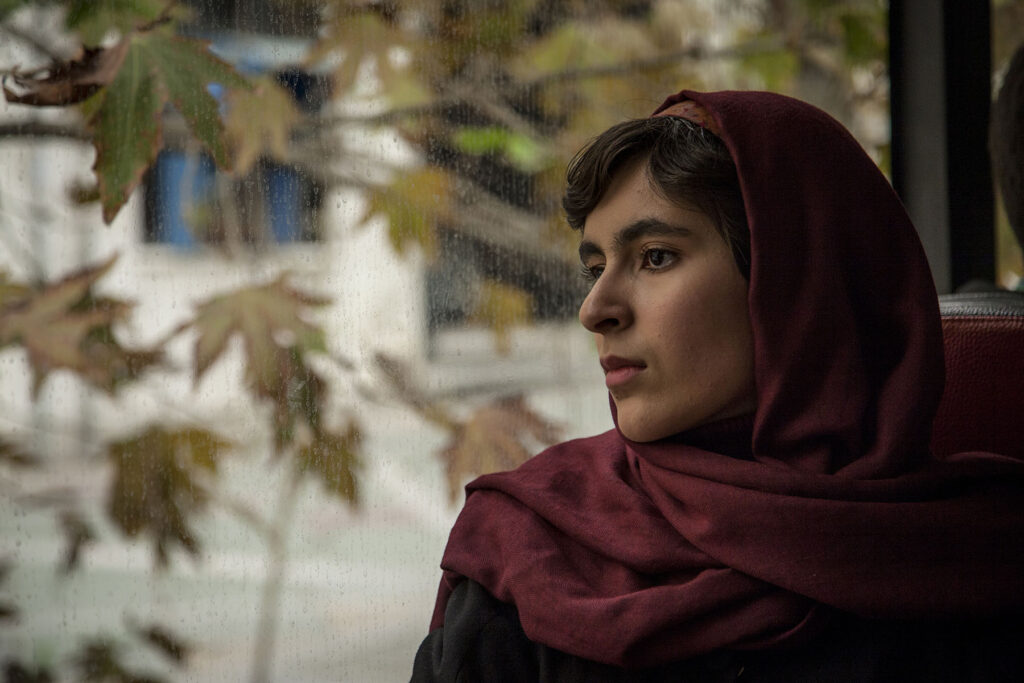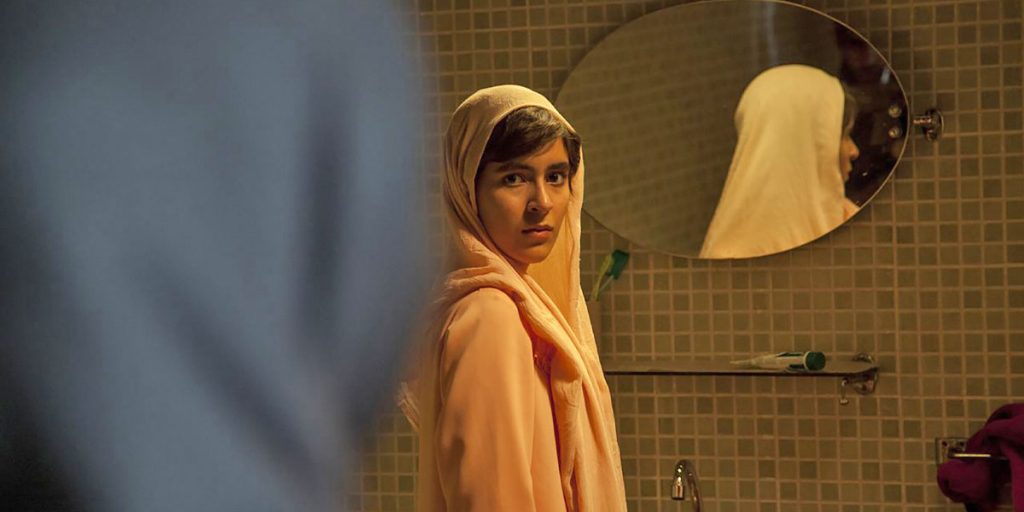Ava tells the personal story of an Iranian teenager raised in a traditional society, tackling important themes such as child-rearing, women’s role in society and trust.
Written and directed by award-winning filmmaker Sadaf Foroughi, Ava (“voice” in Persian) is a low-budget drama that was fully shot in Iran over 18 days. It premiered at the Toronto Film Festival last year, where the director won the Fipresci Prize and also received an Honourable Mention for Best Canadian First Feature film. The interesting fact about the film is that it took almost a year for Foroughi to find the right girl for the main role of Ava. The director flew from Canada to Iran a few times, until she accidentally found the one who fit all requirements: in an interview at New Directors/New Films Festival, she explained that she needed a leading actress with a specific facial expression, and someone who played the violin and could also relate to the story. The director chose her actors meticulously, and her efforts paid off, as that is partly the reason why the film looks so realistic: all the characters look as though they were in their natural environment.
The main character, Ava (Mahour Jabbar, in her first on-screen role), is a young teenage girl who is stuck between a strict conservative household and a depressing school life, both elements that stand in the way of her true dreams and desires. Ava is like a bird kept in a cage: she is not able to show all her talents and personality, as both are hidden behind strict rules and social norms and traditions. Her mother (Bahar Noohian) is overprotective and has a tendency to overreact to events, and this makes Ava lie, hide, and distrust her even more. Ava’s father (Vahid Aghapoor) is the one who supports her life choices, as he clearly understands how damaging and toxic her mother’s parental approach is. Observing his positive character made me feel comfortable and secure. His witty comments, calm behaviour, and unobtrusive interference relieve the tension between Ava and her mother, and serve as comic relief throughout the whole film. Ava is quite an unusual and complex character, as she manages to combine traits like calmness and patience with stubbornness and rebelliousness, at the same time. Thus, Ava might be hard for some to relate to, considering that we all come from different backgrounds, have different beliefs and we were all raised in different households, but anyone who watches the film will certainly feel compassionate about her life struggles.
Do not be confused by the description above: Ava is still like every teenage girl – she is attracted to everything that is referred to as “adult things” – make-up, sleepovers, and relationships. She looks up to her girlfriends, who seem to be more confident and mature for their age. The school aggravates her already tough teenage life by controlling girls’ private lives and the way they dress and behave, representing a very conservative organisation that shames any kind of relationship between girls and boys. The school fails at sex education, and that is exactly what breeds reckless teens who want to try the “forbidden fruit”. The principal (Leily Rashidi) is a strict and super religious lady, who supervises girls and takes the liberty of checking the girls’ belongings. So now, we can imagine how Ava’s life is not a bed of roses, considering the kind of suppression she is subject to, both at home and at school.
Ava clearly attempts to portray its protagonist in a dynamic way: Ava has the potential to become a powerful, positive example for the viewers, as she is a girl with a strong personality who fights for her dreams in a society that distrusts and limits her. Yet, though she certainly comes across as a rebellious and desperate teenager, she is never developed any further, as the film ends exactly the way it started. Not only is Ava’s character never properly developed, as you would expect in a film that tackles such important issues, but neither are the other characters. For instance, Ava’s father and mother remain static characters throughout the story: even though this might have been a deliberate choice by Sadaf, it contributes to making the plot more predictable.

The use of focus is rather unusual, and worth a mention. Sometimes the shots are blurry, which makes the viewers focus more on the sounds (dialogues and music) than on the visual information, and creates more engaging, versatile scenes. Moreover, Foroughi uses long takes with minimum editing and very few cuts which, along with practical, down-to-earth dialogues between its characters – the kind of dialogues you’d hear in every family’s kitchen – make up a very realistic picture.
The emphasis on the details helps us understand the bigger picture of the story: since the characters do not always vocalize their thoughts and deep feelings, the close-ups of their eyes and movements of their hands translate their emotional states instead. These close-ups were effectively incorporated, as they make the scenes more emotionally charged. For instance, in one of the intense scenes when the principal lectures Ava in front of her dad, the camera cuts to a close-up of Ava’s hand trying to reach her father’s hand. This little detail is quite a powerful tool, as it explains more than anything else, even more than words – Ava sees her father as her protector, and seeks his support in a stressful situation.
Foroughi explains that “Ava has been written and directed as a piece of music.” The music, particularly the classical music that Ava plays on her violin, has an important, even symbolic, role in the movie. It is soothing for the ears of the viewers, but, if we dig deeper, it is partly the reason for the disputes between Ava and her mother. For Ava, her violin and music in general play a very significant role, while they have no place in her mother’s idea of Ava’s successful future. There is one scene in which Ava plays the violin: she is sitting with her face turned away from the camera, and she appears as a blurry figure. We can only distinguish her silhouette, and her playing the violin is at the centre of our attention. Then, as her mom disrupts her playing, even though we can’t see Ava’s face distinctly, we can assume what she feels in that moment. This scene stands out because it perfectly summarises the relationship between Ava and her mother – awkward, tense, and lacking mutual understanding.
Even if it was shot in Iran and it revolves around the struggle between tradition and modernity in Iran, the film conveys a universal message. Simply put, Ava is about women and the struggles they have to go through. The mother-daughter relationship gradually builds up tension, reaches its heating point but does not have a logical resolution in the movie. While this is not necessarily a bad choice, as it resembles relationships in real life, it would have been nice to see some changes in the mother’s conservative mindset and her attitude towards Ava. This would have shown that her mother, at least, realised how ignorant she was about Ava’s opinions, and could have been a great example for all of the parents out there, who struggle to find common ground with their teenagers. The movie leaves us with an open ending, and it is up to our imagination how Ava’s life has turned out: according to Foroughi, Ava is only the first part of the trilogy, and she is already working on her second feature.
Ava is an honest, clear-eyed film that speaks up about the challenges that women experience not only in Iran but possibly anywhere in the world.
Ava will be released on Digital in the U.K. on August 21st, and it will be available to watch on Curzon Home Cinema and the BFI Player. It will also be screened in Virtual Cinemas, with 50% of the rental going to the cinemas.

